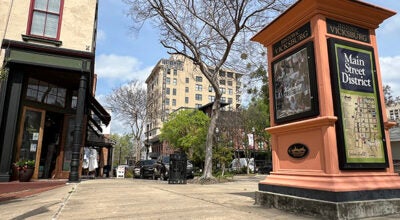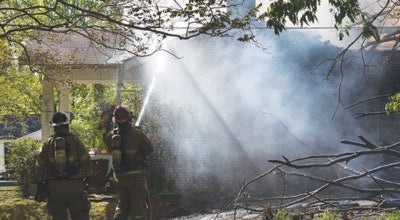City gas bills could jump after Monday
Published 12:00 am Thursday, February 1, 2001
[02/01/01] Cash reserves have been hit hard and in March customers of Vicksburg natural gas system may be joining those with super-high utility bills.
Mayor Robert Walker said Wednesday that the city will consider adjusting gas prices to reflect the amount the city is paying for natural gas.
“We’re recommending reworking the rate to adjust itself to the rate we pay our supplier,” Walker said. “We have to change the gas rates by ordinance, so any increase or decrease will not go into effect until after the Board of Mayor and Aldermen take a vote.”
Walker did not have a date of when the board will vote on establishing new prices, but said officials will be looking at getting a flat rate from suppliers and that residents’ rates will be based on consumption. He also said the city may use a little more of the reserve fund and that it may be discussed at the next board meeting, Monday.
This winter, Vicksburg has been dipping into a $6.5 million reserve fund instead of passing through the nearly tripled prices the city is paying its gas suppliers. Customers’ bills have risen markedly, but mostly due to cold weather. If bills had reflected the city’s actual expense, those that doubled would have quadrupled or more as they have in Claiborne and other area counties.
South Ward Alderman Sam Habeeb said he is not sure what the vote on new rates will be, but said the city could have been a better money manager.
“If we had saved more, we would have been able to lessen the increase,” Habeeb said. “It comes down to how the city has managed the money in the last eight years.”
The good news for consumers is that if the city acts to raise its rates this month, there’s a 30-day wait for implementation and temperatures should be rising, lessening demand, from now until spring.
Habeeb also said he recognizes the role increasing prices set by suppliers have played and isn’t certain of how he would vote on a proposal to adjust the rates.
“I would legitimately oppose some portion of increase but I also recognize the astronomical increase in the open market,” he said. “At this point, adjusting the bill may be the only way.”
Habeeb also credits Paul Rogers, a former city clerk, for advising the city to set up a reserve fund several years ago to help with the fluctuating gas market.
“He told officials to set a gas rate and gave them advice on the market,” said Habeeb. “He deserves credit for delaying an increase.”
The new rates may come as soon as this month, but Walker said help for people with exceptionally high bills will continue for January expenses.
“We set up a payment plan for those with extremely high bills and accept partial payments with 60 days to pay off the balance,” said Walker. “We’re trying to be understanding of extenuating circumstances. We intend to do that for January and hopefully there won’t be a need after that.”
In December 2000, the city paid $5.86 per 1,000 cubic feet compared to $1.98 in December 1999. Close to $4 million of the reserve fund is expected to be used to offset the city’s increased costs.
Other areas have been hit worse, including some City of Vicksburg residents who were annexed in 1990, but continue to be served by a private utility.
“The increase is due to big oil companies like Texaco, Exxon and Mobil,” said Nathan Morgan, manager of Union Gas. “They claim it’s from the last three years when temperatures were mild and they didn’t sell a lot of gas. There is more demand, so they increased the price.”
Union Gas, which provides service for Port Gibson, Claiborne County and parts of south Vicksburg, is also working out payment plans to assist customers with rising costs.
“We’re taking partial payments for the ones who can’t pay their bills, but the company has to survive just like the people,” said Morgan. “Union Gas, as a company, hasn’t had a rate increase in 13 years. We’re just keeping up with the oil companies increase.”
The heating crisis has trickled down to students in Port Gibson schools, who were advised to start wearing jackets to class after the district received a $57,214 natural gas bill.
Schools and municipalities across the state have found their budgets strained this winter as short gas supplies and an unusually cold winter have pushed gas bills to record levels.
The Port Gibson district pays to heat the high school, middle school and elementary school that serve a combined 2,000 students. The district also pays to heat its administrative offices, a vocational technology center and two former principals’ houses that the district leases to tenants.
The rent from the houses does not cover the natural gas bills for the properties, said Superintendent Cardell Williams.
“We’re already in the red as far as allocated money, and it’s only January,” Williams said.
Besides turning down the thermostat and asking students to bundle up, school district officials are discussing cutting the budget for after-school programs and borrowing money from a reserve fund.
“We don’t want to do anything that will interfere with student achievement,” Williams said. “But we looked at the budget, and we have found some places where we can do some transferring.”
The high cost of heating will continue as long as demand is high and the amount of the increase came as a shock to the utility companies as well, said Morgan.
“I don’t think it was necessary to raise it as high as it is,” he said. “We knew it was going to increase but we didn’t realize it was going up that much. There’s nothing we can do about it, we just have to survive it, but it’s never going to be what it was before.”





